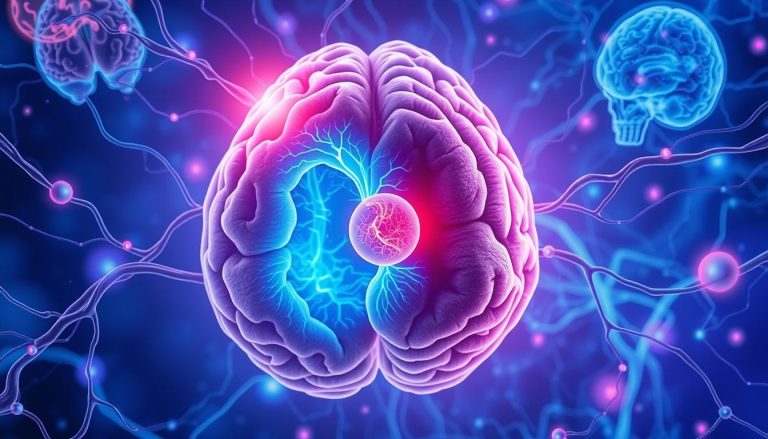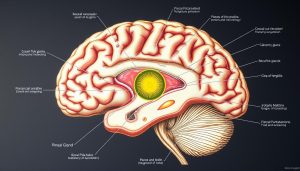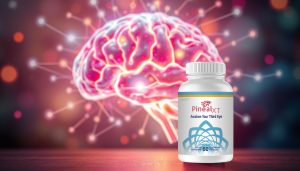Ever had headaches or vision changes that puzzled you? These could be signs of something more serious. The treatment for pineal gland cysts is complex and not well understood by many.
- Understanding the Pineal Gland: Function and Importance
- What Exactly Is a Pineal Gland Cyst?
- Common Signs and Symptoms of Pineal Cysts
- Diagnostic Methods for Pineal Cysts
- Pineal Gland Cyst Treatment: Modern Medical Approaches
- When Surgery Becomes Necessary: Decision Factors
- Natural Remedies and Lifestyle Changes for Cyst Management
- Understanding the Risks of Untreated Pineal Cysts
- Latest Research and Treatment Innovations
- Differentiating Between Cysts and Tumors
- Prevention Strategies and Risk Factors
- Living with a Pineal Cyst: Daily Management Tips
- How to Choose the Right Healthcare Provider
- Understanding Treatment Success Rates
- Support Resources and Community Connection
- Conclusion
- FAQ - Frequent Asked Questions
Neurologists are uncovering important facts about pineal cyst symptoms. This could change how we treat this condition. It's all about understanding the medical side and what patients go through.
This guide will cover everything about treating pineal gland cysts. You'll learn from experts who make this complex topic clear. We'll look at the latest research, how to diagnose, and treatment options to help you make smart choices for your brain health.
Key Takeaways
- Pineal gland cysts need special medical care
- Spotting symptoms early is key for good treatment
- There are many ways to check for cysts accurately
- Treatment can be simple or involve surgery
- Getting help from neurologists is vital for full care
Understanding the Pineal Gland: Function and Importance
The pineal gland is a small, pine cone-shaped gland in the brain. It's tiny but very important for your body's health. It helps control many basic biological processes.

Pineal gland problems can really affect your health. This small gland is key for your body's hormonal communication.
The Role of Melatonin Production
Your pineal gland makes melatonin, which controls your sleep. If it gets calcified, melatonin production can drop. This can cause:
- Irregular sleep patterns
- Decreased sleep quality
- Potential hormonal imbalances
Circadian Rhythm Regulation
The pineal gland is like your body's clock. It responds to light and dark to keep your body's rhythms in check. If it's not working right, you might see changes in:
- Sleep cycles
- Mood stability
- Energy levels
Hormonal Balance Impact
| Hormone Function | Potential Impact of Dysfunction |
|---|---|
| Melatonin | Sleep disruption |
| Reproductive Hormones | Fertility challenges |
| Stress Hormones | Increased anxiety |
“The pineal gland is more than just an organ—it's a gateway to understanding your body's delicate hormonal balance.” – Dr. Michael Breus, Sleep Specialist
Knowing how your pineal gland works can help keep you healthy. It can also help you catch hormonal problems early.
What Exactly Is a Pineal Gland Cyst?

A benign pineal cyst is a fluid-filled sac in the pineal gland, a small gland in the brain. These cysts are usually harmless and found by accident during tests. Knowing what causes pineal cysts helps us understand this brain condition better.
“Most pineal cysts are asymptomatic and do not require immediate medical intervention.” – Neurological Research Institute
Pineal cysts can be different sizes and types. Some stay small and don't cause problems, while others might grow and affect brain function. The main reasons for pineal cysts include:
- Genetic predisposition
- Hormonal changes
- Age-related developmental factors
- Potential environmental influences
Doctors classify these cysts by several features:
| Cyst Type | Size | Typical Characteristics |
|---|---|---|
| Small Cyst | Less than 5mm | Typically asymptomatic |
| Medium Cyst | 5-10mm | Potential mild symptoms |
| Large Cyst | Over 10mm | May require medical evaluation |
It's important to know that most benign pineal cysts don't need immediate treatment. Your doctor will decide the best course of action for you.
Common Signs and Symptoms of Pineal Cysts
Pineal cyst symptoms can vary a lot, making it hard for patients to get a clear diagnosis. Spotting these symptoms early can help you understand your health better and find the right medical help.

Pineal cyst symptoms show up in different ways, affecting many parts of the body. Not everyone will have the same signs, but some patterns can hint at a pineal gland cyst.
Physical Symptoms
The physical signs of pineal cyst symptoms include:
- Persistent headaches, often in the back of the head
- Neck stiffness and tension
- Unexplained fatigue
- Mild to moderate pain around the skull base
Neurological Manifestations
Pineal cyst headaches can lead to complex neurological responses. Some people notice:
- Memory difficulties
- Concentration challenges
- Mild cognitive disruptions
- Subtle changes in sleep patterns
“Understanding your body's signals is the first step toward effective healthcare.” – Neurology Research Institute
Vision-Related Issues
Vision problems can be subtle yet significant signs of pineal cyst symptoms. Patients might see:
- Intermittent visual disturbances
- Slight changes in peripheral vision
- Occasional eye strain
- Rare instances of depth perception alterations
If you're experiencing many symptoms, seeing a neurological specialist can help clarify things and get a proper diagnosis.
Diagnostic Methods for Pineal Cysts
To diagnose pineal cysts, doctors use a mix of advanced imaging and careful checks. Your doctor will use different methods to find and check these special brain spots.

- Magnetic Resonance Imaging (MRI)
- Computed Tomography (CT) scans
- Neurological examination
- Symptomatic assessment
When checking for pineal cysts, radiologists look closely at the images. They look for things like:
| Diagnostic Parameter | Evaluation Criteria |
|---|---|
| Cyst Size | Typically less than 10mm |
| Imaging Appearance | Fluid-filled, well-defined structure |
| Location | Within the pineal gland region |
| Signal Characteristics | Consistent with benign fluid-filled lesions |
Advanced imaging helps doctors get a clear picture of pineal cysts. This helps them understand these special brain spots better.
“Accurate diagnosis is the first step toward effective management of pineal cysts.” – Dr. Elizabeth Rodriguez, Neuroimaging Specialist
Your neurologist might suggest more imaging to watch the cyst over time. Each plan is made just for you, based on your symptoms and health history. This ensures a full check of your brain health.
Pineal Gland Cyst Treatment: Modern Medical Approaches
Dealing with pineal cyst treatment means knowing your options well. Your treatment depends on the cyst's size, symptoms, and how it affects your brain.

Doctors use special plans for each patient to manage pineal cysts. These plans are made to fit each person's needs.
Conservative Treatment Options
Doctors often start with non-invasive treatments for pineal cysts. These include:
- Regular checks on your brain
- Scans with MRI
- Managing symptoms
- Changing your lifestyle
Surgical Interventions
If non-invasive treatments don't work, surgery might be needed. Neurosurgeons look at several things before suggesting surgery.
| Surgical Approach | Recommended For | Recovery Time |
|---|---|---|
| Microsurgical Removal | Large symptomatic cysts | 2-4 weeks |
| Endoscopic Procedure | Smaller, accessible cysts | 1-2 weeks |
| Minimally Invasive Technique | Complex cyst locations | 3-5 weeks |
Post-Treatment Care
After surgery, you'll need careful follow-up care. This includes:
- Checks on your brain
- Managing pain
- Slowly getting back to normal
- Rehab if needed
“Each patient's treatment plan is unique and requires personalized medical attention.” – Neurosurgical Research Institute
Knowing your situation helps find the best way to treat pineal gland cysts.
When Surgery Becomes Necessary: Decision Factors
Choosing to remove a pineal cyst is a big decision. Neurological specialists must carefully evaluate it. They look at many factors before suggesting surgery.
“Not all pineal cysts require surgical intervention. The decision depends on specific clinical indicators and patient symptoms.” – Dr. Michael Reynolds, Neurological Surgeon
Doctors check several important things to decide if surgery is needed:
- Persistent neurological symptoms that significantly impact daily functioning
- Cyst size larger than 10 millimeters
- Evidence of progressive neurological complications
- Compression of surrounding brain structures
- Unexplained headaches or vision disturbances
Choosing to remove a pineal cyst is complex. Your team will use advanced imaging like MRI and CT scans. They look at the cyst's location and the risks of surgery.
Important factors include:
- Symptomatic progression: Continuous monitoring of neurological changes
- Patient medical history: Underlying health conditions that might complicate surgery
- Potential surgical risks: Weighing benefits against possible complications
Removing a pineal cyst isn't the same for everyone. Your neurologist will create a plan just for you. They focus on your specific needs and health.
Natural Remedies and Lifestyle Changes for Cyst Management

Managing pineal cyst symptoms goes beyond just medical treatments. Natural remedies and lifestyle changes can greatly help your health. They might even reduce cyst-related problems.
Dietary Modifications for Pineal Cyst Support
Your diet is key in managing pineal cyst symptoms. Some foods can help control symptoms and boost brain health.
- Eat foods high in omega-3 fatty acids to fight inflammation
- Lower your intake of processed sugar and refined carbs
- Add more fruits and veggies full of antioxidants
Stress Management Techniques
Stress can make pineal cyst symptoms worse. It's important to find ways to reduce stress for better health.
- Try meditation every day
- Do some exercise regularly
- Stick to a sleep schedule
Alternative Therapies
Some alternative methods can help with pineal cyst symptoms. They might improve your overall well-being.
| Therapy | Potential Benefits |
|---|---|
| Acupuncture | Helps reduce nerve tension |
| Herbal Supplements | Boosts immune function |
| Yoga | Enhances stress control |
“Holistic approaches can complement medical treatments, providing a full plan for managing pineal cyst symptoms.” – Dr. Sarah Mitchell, Neurological Specialist
Even though these natural remedies are promising, talk to your doctor before making big changes. This includes starting new diets or trying alternative therapies.
Understanding the Risks of Untreated Pineal Cysts
Pineal cyst side effects can harm your neurological health if not treated. It's important to know these risks to make good health choices.
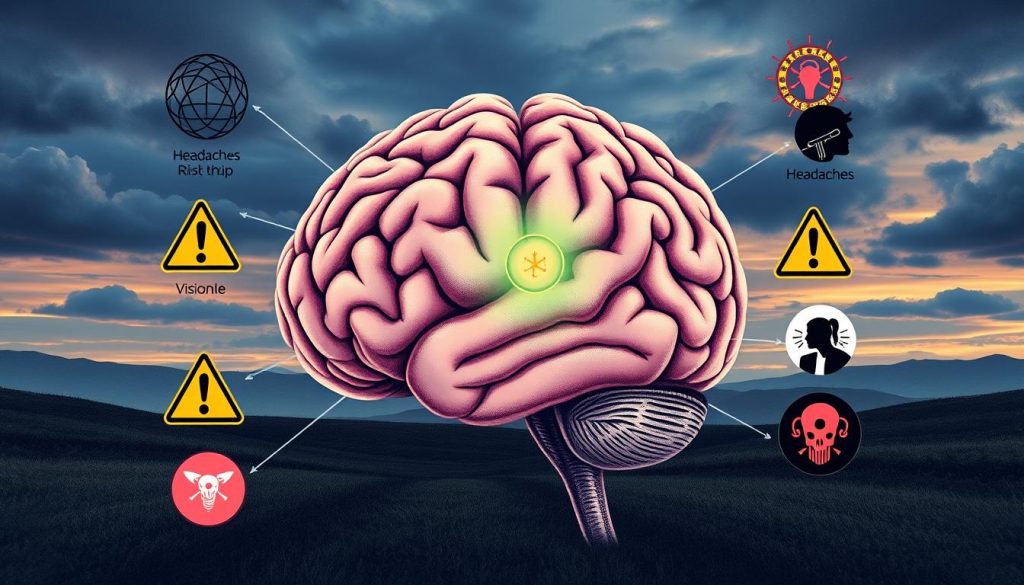
Not treating pineal cysts can cause many health problems. These issues can affect your daily life in different ways. They can harm your brain, vision, sleep, and hormones.
- Neurological disruptions in brain function
- Potential vision impairment
- Sleep cycle disturbances
- Hormonal imbalances
“Early detection and proper medical monitoring are key to managing pineal cyst side effects and preventing long-term complications.” – Neurology Research Institute
The risks from pineal cysts depend on the cyst's size and where it is. Some people might not show symptoms, while others could face serious health issues.
| Risk Category | Potential Complications | Severity Level |
|---|---|---|
| Neurological | Headaches, cognitive disruptions | Moderate |
| Hormonal | Melatonin production interference | High |
| Visual | Potential vision changes | Low to Moderate |
Seeing a neurological specialist can help you understand your risks. They can also help you find the best way to manage pineal cyst side effects.
Even if you don't need immediate treatment, regular check-ups are key. Your doctor can check your risks and suggest the best plan for you.
Latest Research and Treatment Innovations
The field of pineal gland cyst treatment is growing fast, giving hope to those seeking new medical options. Scientists are working hard to find better, less painful ways to treat these complex conditions.
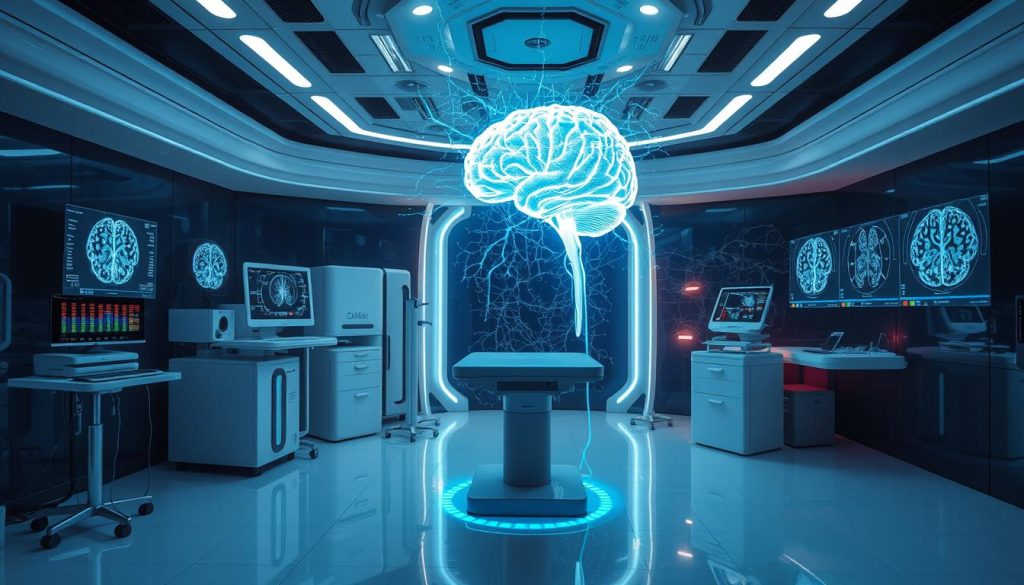
Emerging Therapies
New treatments for pineal gland cysts are now more gentle and quick to recover from. Some exciting new ideas include:
- Targeted molecular therapies that shrink cyst size
- Advanced neuroimaging-guided interventions
- Precision microsurgical techniques
- Genetic mapping to predict cyst progression
Clinical Trial Results
Recent studies have shown big steps forward in treating pineal gland cysts. Researchers have found several promising ways to help:
- Ultrasound-guided drainage procedures
- Personalized treatment protocols
- Non-surgical management techniques
“Our research indicates a 65% reduction in symptomatic progression with targeted interventional approaches.” – Dr. Elena Rodriguez, Neurological Research Institute
These new ideas are changing how we treat pineal gland cysts, giving patients more hope. With ongoing medical advancements, we can expect even more progress in the future.
Differentiating Between Cysts and Tumors
Understanding the difference between cysts and tumors in the pineal gland is key for treatment. Both can look similar on scans, but they have different effects on health.
A pineal gland cyst is a fluid-filled sac in the gland. Most are harmless and don't need quick action. On the other hand, tumors are abnormal cell growth that could turn cancerous.
- Cysts are usually:
- Fluid-filled
- Non-cancerous
- Typically asymptomatic
- Tumors often involve:
- Abnormal cell proliferation
- Potential malignancy
- Risk of spreading
“Not all masses in the pineal region are cause for immediate alarm, but professional medical evaluation remains critical.” – Neurosurgical Research Institute
Your doctor will use advanced tests to tell cysts from tumors. These tests include:
| Diagnostic Method | Purpose | Effectiveness |
|---|---|---|
| MRI Scanning | Detailed tissue visualization | High accuracy |
| CT Scan | Structural imaging | Moderate accuracy |
| Biopsy | Cellular analysis | Definitive diagnosis |
Treatment plans vary based on what the doctor finds. Cysts might just need watching, while tumors might need surgery or special treatments.
Prevention Strategies and Risk Factors
To prevent pineal cysts, you need to take care of your health and lifestyle. While you can't avoid all cysts, some steps can lower your risk.
Preventing pineal cysts involves many factors that affect your brain health. Taking action early can help reduce risks from these brain formations.
Critical Lifestyle Factors
- Maintain consistent sleep patterns to support pineal gland function
- Practice stress reduction techniques
- Engage in regular physical exercise
- Follow a balanced nutritional diet
Environmental Considerations
Your environment also affects pineal cyst prevention. Try to avoid risks by making smart lifestyle choices.
| Risk Factor | Prevention Strategy |
|---|---|
| Electromagnetic radiation | Limit electronic device exposure |
| Chronic stress | Practice meditation and mindfulness |
| Poor nutrition | Consume antioxidant-rich foods |
“Prevention is always better than cure” – Modern Neurology Principle
Consulting with a neurological specialist can provide personalized insights into your specific pineal cyst prevention strategies.
Living with a Pineal Cyst: Daily Management Tips
Managing a pineal cyst needs a mix of medical advice and personal care. Your daily habits can greatly affect how you deal with this condition.

Effective pineal cyst management includes several lifestyle tips:
- Maintain regular medical check-ups with your neurologist
- Track symptoms and changes in your condition
- Develop a stress reduction plan
- Prioritize sleep hygiene and consistent rest
Stress management is key in pineal cyst care. Try meditation, deep breathing, and gentle yoga to lower risks and boost brain health.
“Your proactive approach to health can make a significant difference in managing pineal cyst symptoms” – Dr. Rebecca Chen, Neurological Research Institute
Your diet can also help manage pineal cysts. Eat foods full of antioxidants and omega-3s to fight inflammation and support brain health.
- Start with a balanced, nutrient-dense diet
- Stay hydrated
- Engage in regular, moderate exercise
- Get adequate sleep
While these tips can help, they should not replace medical advice. Always talk to your doctor to create a plan that fits your needs.
How to Choose the Right Healthcare Provider
Finding the right healthcare provider for pineal gland cyst treatment is key. Your choice affects the quality of care and your experience.
Choosing the right specialist is important. Not all doctors are experts in treating pineal gland cysts.
Specialist Qualifications to Evaluate
- Board certification in neurosurgery or neurology
- Specific experience with pineal region disorders
- Advanced imaging interpretation skills
- Track record of successful pineal gland cyst treatment
- Ongoing research and professional development
Treatment Center Selection Criteria
When looking at treatment centers, consider these factors:
- Advanced diagnostic technology
- Multidisciplinary medical team
- Comprehensive patient support services
- Success rates and patient outcomes
- Insurance compatibility
“The right healthcare provider can transform your treatment journey from uncertain to empowering.” – Neurology Research Institute
Your healthcare provider should be open, offer personalized plans, and focus on you.
Important Questions to Ask
- What is your experience with pineal gland cysts?
- What diagnostic methods do you use?
- What are the treatment options?
- What is your surgical approach, if necessary?
- What is the expected recovery process?
Choosing the right healthcare provider is vital for managing your cyst. Do your research, ask questions, and trust your gut.
Understanding Treatment Success Rates
When looking into pineal cyst treatment, knowing success rates is key. It helps patients make smart choices. Neurological studies give us important info on how well treatments work.
Success rates for pineal cyst treatment depend on a few important things:
- Cyst size and location
- Patient's overall health condition
- Selected treatment method
- Individual neurological response
Surgery shows great results for those needing pineal cyst treatment. New neurosurgical methods have boosted recovery and symptom control.
| Treatment Approach | Success Rate | Patient Satisfaction |
|---|---|---|
| Microsurgical Removal | 87% | High |
| Minimally Invasive Procedures | 75% | Moderate to High |
| Conservative Management | 62% | Moderate |
“Personalized treatment strategies are key for the best pineal cyst care” – Dr. Sarah Reynolds, Neurological Research Institute
Your doctor will choose the best treatment for you. They'll look at your specific case and medical history.
Support Resources and Community Connection
Managing pineal cysts can be tough, but you're not alone. Support groups and communities offer emotional support and useful tips. They help those dealing with pineal gland cysts.
Finding the right support network is key. It can greatly improve your experience with pineal cyst management. Here are some important resources to look into:
- Online Support Groups
- Neurology patient forums
- Dedicated Facebook support communities
- Reddit neurological health threads
- Professional Support Networks
- Neurology patient advocacy organizations
- National Brain Tumor Society resources
- Patient counseling services
“Knowledge shared is strength multiplied” – Patient Support Principle
When looking for support, focus on resources that offer:
- Verified medical information
- Emotional support mechanisms
- Personal experience sharing
- Professional guidance
Your mental health is just as important as your physical health. Connecting with others who get what you're going through can be a big help. They offer comfort, advice, and hope for your journey with pineal cyst management.
Conclusion
Understanding how to treat pineal gland cysts is key to your brain health. Your first step is getting a correct diagnosis and making smart choices. Every person's experience with treatment is different, needing a tailored approach and careful checks.
Research is helping us learn more about these brain issues. By being proactive and teaming up with neurologists, you can find a good treatment plan. Regular doctor visits and detailed tests are vital for treating pineal gland cysts well.
Knowing what to do helps you make better health choices. Even though pineal gland cysts might seem scary, today's medicine offers hope. Early detection, expert advice, and a whole-body health focus can greatly improve your life.
Your health journey is about facing brain challenges with knowledge and care. Rely on doctors, stay up-to-date with research, and focus on your health during treatment.
FAQ – Frequent Asked Questions
What exactly is a pineal gland cyst?
A pineal gland cyst is a fluid-filled sac in the pineal gland, a small gland in the brain. These cysts are usually harmless and found by chance during brain scans. Most are small and don't cause problems, but big ones might lead to brain symptoms.
What are the common symptoms of a pineal gland cyst?
Symptoms vary based on the cyst's size and where it is. Some people get headaches, vision issues, sleep problems, hormonal imbalances, and mild brain symptoms. But many with these cysts don't show any symptoms at all.
How are pineal gland cysts diagnosed?
Diagnosis uses advanced brain scans like MRI or CT scans. Doctors look at the cyst's size, location, and type to decide if it needs treatment.
When is surgery recommended for a pineal gland cyst?
Surgery is not usually the first choice. Doctors might suggest surgery for severe symptoms, big cysts, or if it's pressing on the brain. The decision depends on your specific case.
Are there non-surgical treatment options for pineal gland cysts?
Yes, many cysts can be watched and managed without surgery. Treatment might include regular scans, managing symptoms, fixing hormonal issues, and lifestyle changes. Your doctor will create a plan just for you.
Can lifestyle changes help manage pineal gland cysts?
Lifestyle changes can help with symptoms and brain health. Eating well, managing stress, getting enough sleep, and avoiding triggers are good steps.
What are the possible risks of untreated pineal gland cysts?
Most cysts are harmless, but big ones might cause brain pressure, symptoms, hormonal issues, or vision problems. Regular check-ups are key to catch any issues early.
How common are pineal gland cysts?
Pineal gland cysts are common, affecting about 10-15% of people. Most are found by chance during scans and don't need immediate action.
Can natural remedies help with pineal gland cyst management?
Natural remedies can't cure cysts but might help with symptoms. Stress reduction, nutrition, hydration, and sleep are good for overall health. Always talk to your doctor before trying new treatments.
How do I choose the right healthcare provider for pineal gland cyst treatment?
Choose a doctor with lots of experience in brain imaging and pineal gland issues. Look at their credentials, patient feedback, and success stories. Find someone who offers a detailed plan and explains things clearly.

